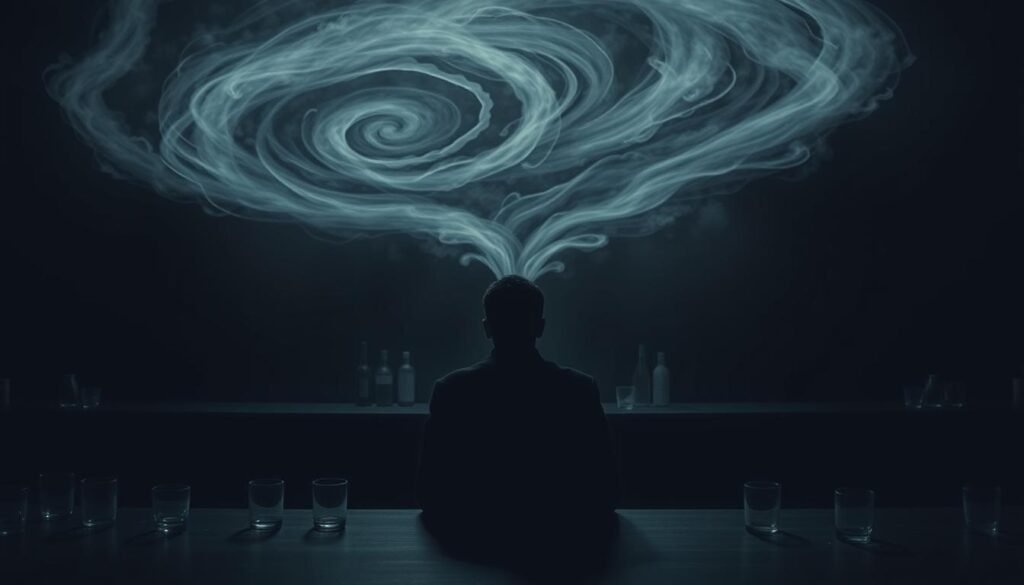Ever wondered why you feel relaxed after drinking but anxious the next day? Alcohol and anxiety have a complex relationship beyond being a social aid. Seeking comfort in a drink might make anxiety worse over time.
Alcohol changes our brain chemistry, affects our sleep, and makes it hard to control emotions. This can increase anxiety and lead to addiction. To understand this, we should look at it from both psychological and physical angles. For more details, visit this resource.
Key Takeaways
- Alcohol consumption can worsen symptoms of anxiety, especially for those already prone to these conditions.
- Using alcohol as a coping mechanism may lead to alcohol dependence, increasing anxiety levels over time.
- Studies show a significant correlation between alcohol use disorders and various anxiety disorders.
- Effective therapies for anxiety and substance abuse include cognitive behavioral therapy, psychotherapy, and medication.
- Mindfulness practices can help alleviate hangxiety and improve mental health outcomes.
The Complex Relationship Between Alcohol and Anxiety
Alcohol and anxiety mix in ways that are hard to untangle, especially for those with anxiety disorders. People often drink to feel better, but this can lead to a reliance on alcohol. This is because they use it to fight overwhelming feelings.
For those with generalized anxiety disorder, the stress never stops. They may drink to forget their constant worries. Social anxiety adds more trouble, pushing some to avoid social scenes. The fear of meeting people can even turn into agoraphobia, a fear of leaving home.
Panic disorder makes things worse, with panic attacks that scare and shake people. To escape these feelings, many find shelter in drinking, even if it’s just for a moment.
Obsessive-compulsive disorder (OCD) and post-traumatic stress disorder (PTSD) also push folks toward drinking. Alcohol can make anxiety symptoms stronger. This creates a cycle, making it hard to tell which came first: anxiety or a need for alcohol. Treating both alcohol use disorder (AUD) and anxiety together is tricky but necessary.
Studies show that half of the people getting help for AUD also have an anxiety disorder. Anxiety and AUD share common causes, meaning both need to be treated together. It’s crucial to get help that looks at the whole person.
How Alcohol Acts as a Depressant on Mental Health
Alcohol serves as a depressant for the central nervous system. It affects mental health in big ways. At first, it might make you feel relaxed and happy.
But over time, the effects can lead to anxiety and dependence on alcohol. Heavy drinking is often tied to feelings of depression. This suggests a link between abusing substances and mental health problems.
Many look to alcohol for quick relief from anxiety. However, this can start a dependency cycle. Studies show that frequent drinkers face more mental health issues.
Those with severe mental illnesses might also use alcohol to cope. This shows the close connection between drinking problems and poor mental health.
Long-term abuse of alcohol makes mental health issues worse. It also increases the risk of serious physical problems, like liver disease and heart issues. Drinking motives change over time; people might initially drink for fun but end up drinking to ease anxiety.
Quitting alcohol, especially for those who are dependent, can be risky. Withdrawal symptoms include low blood pressure, a slower heart rate, and risks of seizures. This underlines the need for safe drinking and awareness of alcohol’s impact on mental health.
| Effects of Alcohol on Mental Health | Short-term Effects | Long-term Effects |
|---|---|---|
| Initial Relaxation | Euphoria, Reduced Anxiety | Heightened Anxiety, Depression |
| Coping Mechanism | Temporary Relief | Increased Dependence |
| Mental Health Risks | None Typically | Increased Risk of Disorders |
| Physical Health Risks | None Typically | Heart Disease, Liver Complications |
The Physiological Effects of Alcohol Withdrawal
Alcohol withdrawals bring on many changes in a person’s body that affect how they think and feel. The body tries to get used to no alcohol, and this messes up the brain chemicals that were once stable. People may feel more anxious, get easily upset, or have sudden mood changes because of this.
Usually, withdrawal symptoms stick around for 5-7 days. However, feeling moody could last longer. It’s very important to find good ways to deal with these tough times. Those who’ve been through detox a lot might face even harder symptoms, like seizures.

Stress from withdrawal can make someone want to drink again. This is common in people who’ve had a problem with drinking. Getting medical help early can ease anxiety and other withdrawal issues. The American Psychiatric Association says many looking to quit drinking also deal with anxiety problems. This shows how closely alcohol issues and anxiety are connected.
During detox, panic attacks are especially scary. They can make your heart beat fast, dizzy you, and scare you a lot. It’s very important to get help quickly. Knowing how withdrawal affects the body helps doctors give better care. This improves recovery and lowers the risk of bad health effects.
If you’re facing alcohol withdrawal, it’s critical to get professional help. This will help manage symptoms better and boost recovery chances. There’s support out there, so you’re not alone in trying to get healthier.
Want to know more about alcohol withdrawal and anxiety? Check out this detailed study.
Can Alcohol Contribute to Anxiety Attacks?
Alcohol and anxiety attacks share a complex and troubling link. In the US, about 20 percent of people with social anxiety disorder struggle with alcohol dependence too. This makes it harder for those who use alcohol to cope with their feelings.
Those who drink a lot over a long time might be more likely to have anxiety disorders. Changes to serotonin and neurotransmitters in the brain can increase anxiety. Drinking can make anxiety worse, with symptoms like shaking, sweating, and high heart rate showing up during withdrawal. This shows alcohol’s big impact on mental health.
Nearly 7 percent of Americans deal with social anxiety disorder. Using alcohol to handle anxiety attacks points to deep issues with substance abuse. Even moderate drinking can turn into dependency if it’s not carefully controlled.
People with alcohol-induced anxiety may start relying on drinking to calm their nerves. As the issue gets worse, they might drink more to feel better or steer clear of withdrawal signs. It’s very important for those facing these problems to get professional help.

Understanding Hangxiety: The Morning After Drinking
Hangxiety combines feelings of anxiety and unease after drinking alcohol. People who drink a lot might feel irritable and blame themselves. Things like not having enough water or nutrients in your body make hangxiety worse. It’s key to know about hangxiety to find better ways to deal with coping mechanisms and mental health issues from drinking too much.
Stress and seeing things that remind you of alcohol can make you want to drink more. This desire is strong in people who often drink a lot. A study in 2019 in Addiction Biology said these folks had more cortisol, making their anxiety worse after drinking. Another report showed women feel this more than men, where drinking a lot and often made their cortisol levels go up.
Drinking can hit your body hard; not having enough water can make your heart beat faster and cause anxiety. In 2020, researchers found just one drink could do this. People should think about how drinking affects their mind, especially if they’re already anxious. Learn about alcohol’s impact on mental health here

How long hangxiety lasts can change based on your genes, if you’re usually anxious, and how you drink. People with alcohol problems may feel anxious two to three times more often after drinking. Using deep breathing, mindfulness, or drinking water before alcohol may help lessen hangxiety.
In short, learning more about hangxiety and why it happens helps people find better coping mechanisms. This improves overall mental health. If alcohol is a problem for you, getting help could make managing anxiety easier.
Alcohol Dependence and Anxiety Disorders
Alcohol dependence often goes hand in hand with anxiety disorders. This situation can be tough for those looking for help. Many times, half of the people treated for alcohol problems also face anxiety disorders. This leads to a vicious cycle where drinking is used as a way to cope, making both issues worse.
In the U.S., anxiety disorders are common, affecting about 11% of people each year. This is backed by large studies, like the Epidemiologic Catchment Area study and the National Comorbidity Survey. They show how widespread anxiety disorders are.
People with an anxiety disorder are more than twice as likely to become dependent on alcohol. The odds are 2.3 times higher for them than for those without anxiety. This suggests anxiety disorders contribute significantly to the severity of alcohol problems.
Behavioral therapies are important in treating both alcohol dependence and anxiety disorders. Cognitive-behavioral therapy (CBT) and dialectical behavior therapy are helpful. They improve outcomes when they address both problems together, compared to focusing on just one.
| Statistic | Value |
|---|---|
| Individuals with AUD who also have an anxiety disorder | Up to 50% |
| Prevalence of anxiety disorders in U.S. (past 12 months) | 11% |
| Odds of developing alcohol dependence if diagnosed with an anxiety disorder | 2.3 times higher |
| Percentage of individuals with social anxiety disorder also struggling with alcohol issues | 20% |
| Effective therapies for co-occurring disorders | CBT, Dialectical Behavior Therapy |
Getting professional help can change lives. It breaks the cycle of alcohol dependence and anxiety. By understanding and treating both, a better treatment plan can be made. This plan is designed just for those who need it.
Coping Mechanisms for Managing Alcohol and Anxiety
People dealing with alcohol use and anxiety need useful coping methods. Mindfulness, like meditation and breathing deep, helps manage stress well. These methods let people live in the now, cutting down anxiety that may lead to drinking.
Exercise is also a great way to cope. It makes the body release endorphins, lifting your mood and easing stress. Activities like yoga, running, or playing sports help fight the urge to drink for comfort.
Writing in a journal is another helpful tool. It lets people find out what causes their stress and why they drink. Writing thoughts down can make it simpler to handle feelings, which leads to better coping ways.
Therapy is crucial in dealing with addiction. Help from experts can reveal deep reasons for alcohol dependence. Cognitive Behavioral Therapy (CBT) is really good for changing thoughts and actions related to drinking and anxiety. Being part of support groups also helps by connecting with others who understand, creating a supportive community.
Building better coping skills can greatly cut down on using alcohol to deal with stress. Taking care of oneself and getting help from professionals sets the foundation for a life that’s more balanced and happy without depending on alcohol.
Behavioral Therapy and Addiction Treatment for Those with Comorbid Disorders
Dealing with anxiety and alcohol use disorders together is hard. Behavioral therapy is key for people facing both issues. About 48% of those with social anxiety disorder (SAD) also have alcohol use disorder (AUD). This shows the need for special treatments for these combined problems.
Cognitive-behavioral therapy (CBT) is a leading treatment for SAD and related drinking issues. It’s more effective than many other methods. CBT helps reduce social anxiety and lowers alcohol use in social settings. Research shows motivational enhancement therapy (MET) also works well for AUD, just like CBT and 12-step programs.
Support groups add a lot to recovery. They offer a space for people to support each other. This helps participants feel less alone and boosts their mental and alcohol recovery outcomes.
Treating both social anxiety and alcohol dependence together is complex. Sometimes, CBT for both SAD and AUD doesn’t work as well later on. It’s important to make a treatment plan that addresses the unique needs of those with these issues. Some CBT methods could make anxiety worse for those using alcohol to cope. So, an integrated treatment plan is crucial.
| Treatment Method | Effectiveness | Target Population |
|---|---|---|
| Cognitive Behavioral Therapy (CBT) | Highly effective | Individuals with SAD and AUD |
| Motivational Enhancement Therapy (MET) | Effective, cost-efficient | Those with AUD, especially concurrent issues |
| Twelve-Step Facilitation | Higher abstinence rates | Individuals seeking support through AA |
| Contingency Management | Effective in increasing abstinence | General treatment for substance use |
A mix of behavioral therapy and support groups greatly helps recovery from both anxiety and alcoholism. Personal treatment plans help people tackle these issues together. They support a better and healthier life ahead.
Conclusion
It’s key to understand how alcohol and anxiety connect, especially for those facing these challenges. Around half of the people with an anxiety disorder also deal with alcohol problems. This indicates alcohol may worsen mental health by affecting the brain. So, making informed choices about alcohol is vital for good health.
Overcoming alcohol and anxiety issues means more than just stopping drinking. It involves therapies like cognitive-behavioral therapy (CBT) and dialectical-behavioral therapy (DBT). Making changes to your lifestyle, such as eating better and exercising, also helps. Reaching out for specialized help is important, especially in areas like Los Angeles where many resources exist.
Becoming aware and actively managing alcohol and anxiety is crucial for a better life. Recognizing symptoms and acting on them can lessen their impact on mental well-being. Starting with a self-assessment tool is a good first step towards getting the right support. Early action makes recovery from anxiety and alcohol issues more likely. For further help, visit this self-assessment resource.